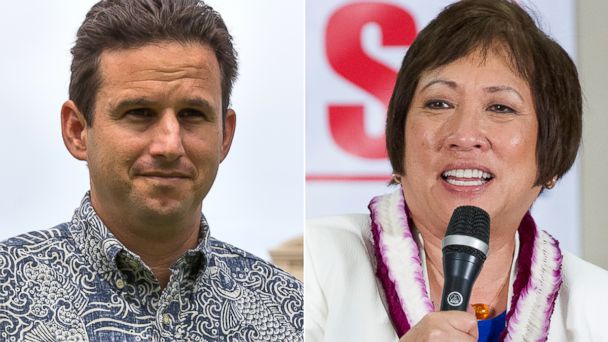Fewer Than 8,000 Voters Will Determine the Hawaii Senate Election

(Getty Images|AP Photo)
It's likely the Democratic Senate brawl in Hawaii is getting closer to its end, with a result coming as soon as today for the Aloha State.
It all comes down to fewer than 8,000 voters who will finally decide the fate of incumbent Sen. Brian Schatz or challenger Rep. Colleen Hanabusa. The election was held last Saturday, but remains too close to call with Schatz leading by just over 1,600 votes. Today, two precincts on the Big Island of Hawaii who were unable to get to their voting locations last Saturday due to the wrath of Hurricane Iselle will get an opportunity to cast their ballots.
Hanabusa was trying to delay the vote, filing a suit Thursday saying people are still trying to get the "basic necessities" of food, ice, water, and power so voting is the last thing on their mind. She was also concerned that without power voters may not even know about the rescheduled election. Both Hanabusa and Schatz traveled to the Puna area of the Hawaii Island, known as the Big Island, after the storm to help with clean-up and campaign for those last critical votes. Both have said the recovery is their priority.
Hanabusa's campaign says the judge denied their request and the Chief Elections Officer Scott Nago says the vote will go on today. In a statement, he says the election will continue for those two Big Island precincts. The two precincts include about 8,000 voters, but about 20 percent voted early or by absentee. With those polls closing at 6 p.m. local or midnight on the east coast, Hawaii officials say there should have a winner late tonight.
Colin Moore, a professor of political science at the University of Hawaii, tells ABC News it may be "technically possible" for Hanabusa to pull ahead, but "it's very unlikely." It's not just making up the votes, Moore points out, but Schatz won in both other precincts in the Puna area of Hawaii Island.
"That means she would have to convince the relatively small number of remaining voters to support her overwhelmingly," Moore said, adding he expects a "post-election challenge" from Hanabusa if she's not successful today.
That won't be easy, though. Unlike other states, Hawaii has no automatic recount or run-off trigger if the vote between Schatz and Hanabusa narrows even more. Rex Quidilla, spokesman for Nago's office, says a campaign could choose to file an appeal or a contest of the results with Hawaii's State Supreme Court and a recount could be one of the remedies that are prescribed. But it's "not a guarantee," and they must "prove the results should have been different," in order for the court to allow a recount, he said.
As for Hanabusa's argument that voters may not even be aware of the rescheduled vote, Moore says "there has been a tremendous amount of press coverage about the election."
"I'm sure the affected voters will hear about it from the two campaigns and from their friends and neighbors," Moore said. "That said, many people in Puna still don't have electricity or water, so they may not have an opportunity to vote."
So, how did things even get to the point where Hanabusa challenged the incumbent senator? It's been a bruising intra-party brawl. It started in December 2012, when Sen. Daniel Inouye, who had represented Hawaii for 50 years, passed away. His dying wish was that Gov. Neil Abercrombie appoint Hanabusa, his political protégé, to his seat after he died. That didn't happen and instead he appointed then-lieutenant governor Brian Schatz.
Abercrombie maintains Inouye said it was ultimately his decision, but Inouye's widow is backing Hanabusa. Hanabusa decided to challenge Schatz for the Senate and Abercrombie lost his job by a massive 35 point margin last Saturday, partly because of the Schatz appointment. It was the first time an incumbent ever lost reelection in a primary in the island state.